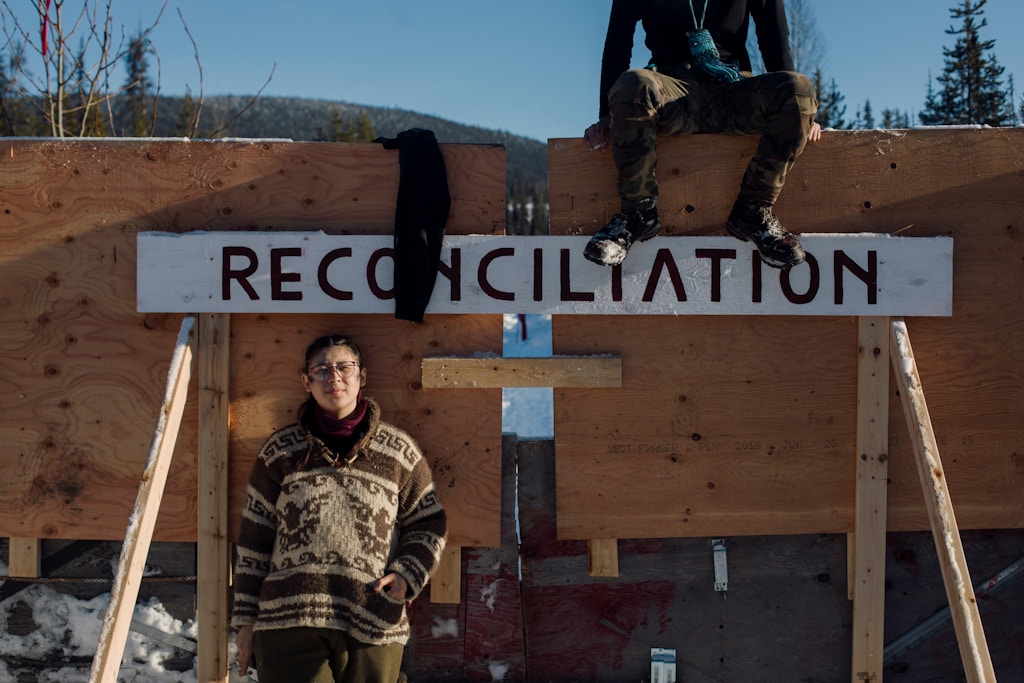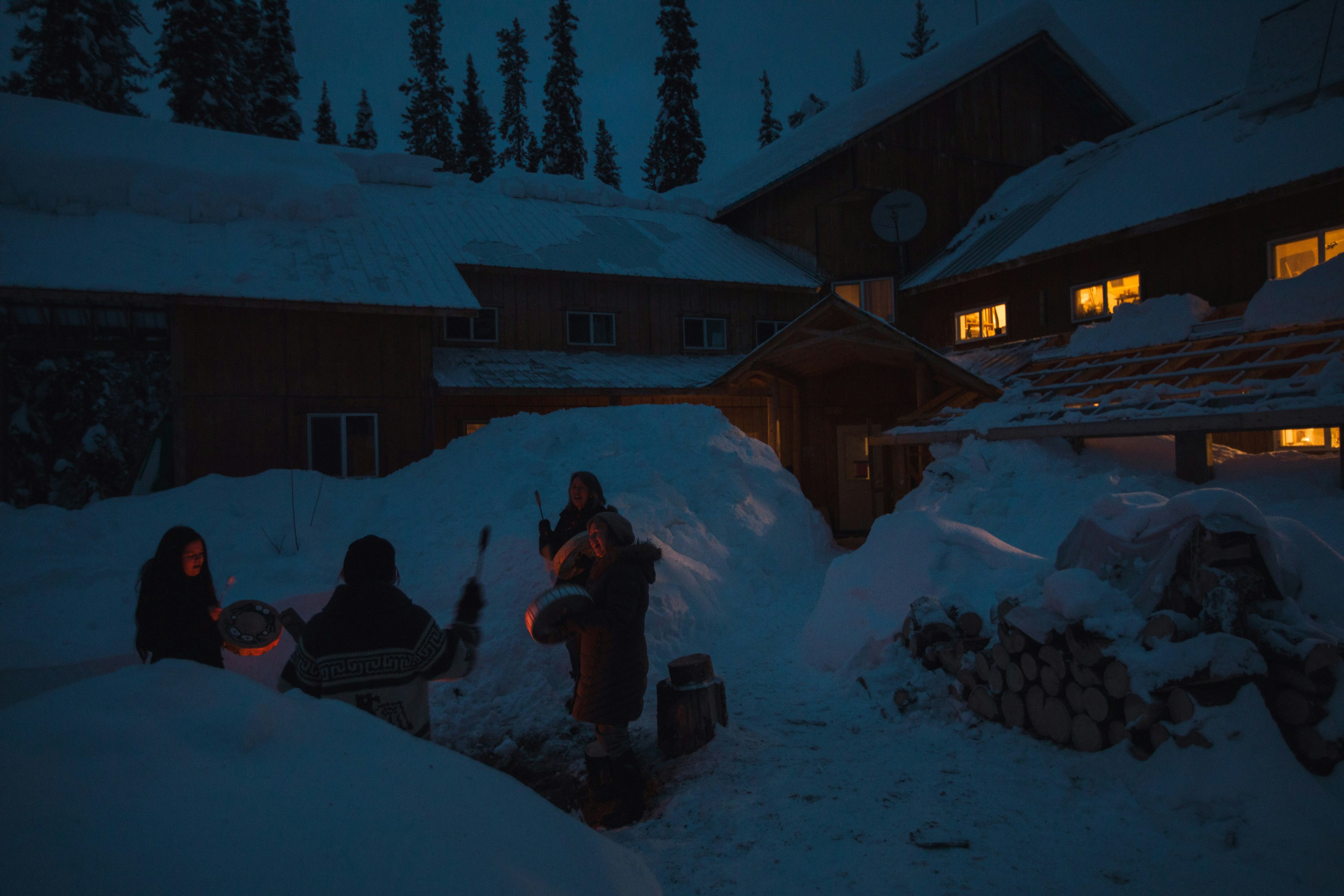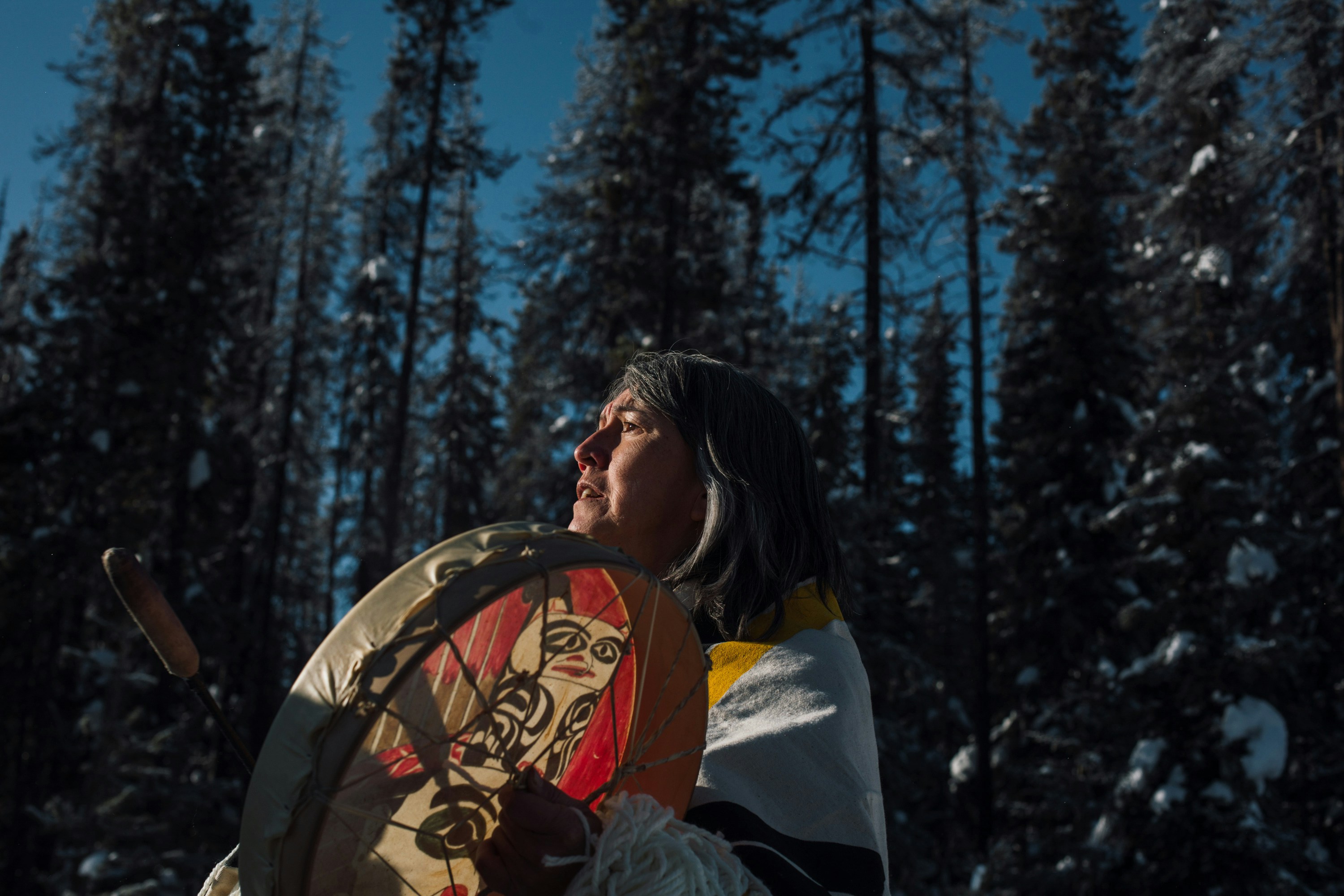Tait’s aunt Freda Huson has lived on the territory since she built the first Unist’ot’en cabin in 2010, directly in the path of at least three proposed pipelines that would stretch across pristine mountain wilderness to export facilities in the coastal community of Kitimat. Unist’ot’en, which has grown to include a bunkhouse, a traditional pit house, traplines, and a three-story healing center, is associated with one of 13 houses that make up the Wet’suwet’en Nation. The camp is the oldest and most remote of a series of Wet’suwet’en camps established along an old logging road as an assertion of the nation’s right to decide what happens on their territory. Until this month, members controlled access to the area with gates constructed in the middle of the road.
One of the proposed pipelines, Enbridge’s Northern Gateway tar sands oil pipeline, was canceled in 2016. The future of a second, the Pacific Trails natural gas pipeline, was thrown into uncertainty after Chevron announced plans to divest its 50 percent share. But TC Energy, formerly known as TransCanada, has forged ahead with the Coastal GasLink project — despite opposition from the Wet’suwet’en Nation’s traditional leaders, the hereditary chiefs.


Photo: Amber Bracken
TC Energy obtained an initial injunction to force Unist’ot’en members to get out of the way of construction in December 2018. Royal Canadian Mounted Police commanders claimed “lethal overwatch” was required, according to documents revealed by The Guardian, and instructed officers to “use as much violence toward the gate as you want.” After the RCMP arrested more than a dozen pipeline opponents that January, a strained peace was established. Police maintained a presence in the area, spending more than $3 million to establish a station halfway up the logging road to the camps. Unist’ot’en members negotiated access for pipeline workers as long as they followed an agreed-upon protocol, but TC Energy claimed the checkpoints continued to slow their work.
In the latest court order, the judge argued that the Wet’suwet’en Nation’s title claims and jurisdiction remained unresolved. In response, pipeline opponents abandoned the access agreement, and the hereditary chiefs demanded that Coastal GasLink vacate the territory immediately.
On February 6, Unist’ot’en members watched on social media as the RCMP mounted a dramatic pre-dawn raid on a smaller support camp down the road, arresting six people. But rather than serving to quell the resistance, the arrests inspired a wave of solidarity protests and transportation blockades across Canada. Protesters shut down ports, roads, and railways from Vancouver to Saskatchewan, and a blockade set up by Indigenous-led protesters from the Tyendinaga Mohawk Territory in Ontario halted commuter rail traffic between Montreal and Toronto.

Victoria Redsun, left, waits with another supporter at the gate leading to the Unist’ot’en camp. The word “reconciliation” is written across the gate as a statement of what police, the government, and Coastal GasLink would destroy by forcing entry into Wet’suwet’en traditional territory.
Photo: Amber Bracken
On February 10, a helicopter delivered RCMP officers and snowmobiles behind the Unist’ot’en gate. They watched from a hill overlooking the camp as more officers approached from the road. Surrounded on all sides, Tait, her mother, her aunt, and four supporters stood near the barrier, praying and drumming. Tait was the third to be arrested. “Two officers came around me and held my arms to try to prevent me from drumming,” she said. They continued to sing, even as they were loaded into the police van.
While the Canadian government continues to pursue a yearslong effort to heal its relationship with Indigenous people, for many, the arrests of the Unist’ot’en matriarchs were representative of the government’s unwillingness to take meaningful action toward reconciliation — especially when it comes to land rights. Indeed, documents uncovered by journalists and researchers confirm that officials have strategized furiously about how to prevent the Wet’suwet’en people’s assertion of land rights from getting in the way of the message that Canada is open for business.
“The violence of Canada and the emptiness of its commitments to us as Indigenous people were laid bare in their actions, and their forcible removal of us in the midst of ceremony,” Tait said. “The events we experienced leading up to February 10 are another culmination of the efforts of Canada to discredit and criminalize us for simply existing on our land as we always have — for defending our rights to our landbase and our historic economy, our ways of empowering ourselves — because of the threat to the capitalist economy.”
In the wake of the police raids, leaders of the movement declared, “Reconciliation is dead.”

Photo: Amber Bracken
“An End of Aboriginal Rights and Title”
The Wet’suwet’en Nation has never signed treaties or ceded territory to the Canadian government — a fact that its leaders have defended fiercely in court as well as on the ground. Its hereditary chiefs were behind a landmark Supreme Court of Canada decision in 1997 known as Delgamuukw vs. the Queen, which recognized the existence of aboriginal title, whereby Indigenous people have the right to “exclusive use and occupation” of territory. However, because of a technicality, the court did not resolve the boundaries of the Wet’suwet’en’s claim to 8,500 square miles of land, stating that title would have to be sought through separate legal or treaty-making proceedings, which were never completed.
Documents obtained by the Canadian publication The Narwhal show that the Delgamuukw decision sent chills through Canadian extractive industries. The documents indicate that the government of British Columbia, a province largely made up of unceded territory, rushed to reassure industry officials, inviting them to provide input on a treaty-making process meant to settle questions over authority on unceded land.
In one memo, describing a meeting held in the wake of the ruling, Marlie Beets, then vice-president of the B.C. Council of Forest Industries, told B.C. officials that Indigenous nations must hand over their land to Canada. “The decision makes the need for certainty through surrender all the more clear,” she said. “We see no other alternative.”
Other industries echoed the alarm. “The oil and gas industry in particular has expressed concern about their ability to continue to do business in the province absent a clear direction from the government on how it will address the implications of the Delgamuukw decision,” stated a memo by a Delgamuukw strategy team formed by the government. At a meeting set up by British Columbia’s treaty officials, one lawyer, whose client is unclear, underlined that “what is needed is a clear exchange and an end of Aboriginal rights and title for a defined set of treaty rights.”




First/Top Left: Supporters look on as Wet’suwet’en women sing and pray at the sacred fire outside the healing center on Feb. 6, 2020. Second/Top Right: Wet’suwe’ten family and other supporters gather with Freda Huson, left, in the dining hall at the healing center on Jan. 15, 2020. Third/Bottom Left: Karla Tait beads her regalia on Jan. 20, 2020, hurrying to finish so her mother can wear it in ceremony. Fourth/Bottom Right: Victoria Redsun plays with a puppy at the healing center on Jan. 15, 2020.Photos: Amber Bracken
The Delgamuukw ruling took place just as discussions were coming to a head about how Canada should address the severe harms wrought by its residential schools. For more than a century, Canada had forcibly removed Native children from their families and sent them to remote schools where they were barred from speaking their language and practicing their culture. Many experienced physical and sexual abuse.
As officials were wringing their hands about the court decision, the federal government provided a grant of $350 million to the Aboriginal Healing Foundation, meant for survivors of Canada’s residential schools. In a memo to the B.C. Ministry of Aboriginal Affairs, British Columbia treaty negotiators suggested that the money could be used as leverage. Prioritizing it for First Nations that participated in the negotiations process could “sweeten the deal,” the memo stated.
“There were many ideas put forward as public servants brainstormed about how to move forward. The grant was never used for this purpose,” Sarah Plank, communications director for the Ministry of Indigenous Relations and Reconciliation, said in a statement to The Intercept. The province’s approach has evolved over the past 20 years, she added, and does not require Indigenous nations to relinquish their rights. Plank described reconciliation as an “all-of-society journey” best achieved with feedback from stakeholders including industry.
The first Unist’ot’en checkpoint was erected a year after the establishment of a Truth and Reconciliation Commission created to offer recommendations for how the Canadian government should address the residential system’s impact. With the Unist’ot’en camp sitting in the middle of a planned pipeline corridor meant to bolster Canada’s status as an energy superpower, and with the Delgamuukw case undermining Canada’s attempts to override the Wet’suwet’en hereditary chiefs, the stage was set for a clash between reconciliation and fossil fuel interests.

Photo: Amber Bracken
Stifling the Movement
The Royal Canadian Mounted Police have played a key role in Canada’s attempt to protect business interests from Indigenous land claims. The law enforcement agency has closely monitored the Unist’ot’en camp since its inception, labeling those involved with the Wet’suwet’en resistance as extremists. The Aboriginal Policing Services branch of British Columbia’s RCMP circulated regular updates on the camp, keeping tabs on mundane activities such as the construction of a root cellar and garden, according to documents obtained by Andrew Crosby and Jeffrey Monaghan, authors of the book “Policing Indigenous Movements.”
The camp was also targeted by an RCMP surveillance program called Project Sitka. The program was launched in the wake of massive Idle No More protests in 2012 and 2013, which were inspired in part by Indigenous objections to the Northern Gateway pipeline and legislation limiting Indigenous consultation on development projects. Using pseudo-scientific methods, the RCMP attempted to predict which participants in Indigenous social movements were most at risk of disruptive or criminal behavior, investigating 300 activists and compiling a list of 89 who merited ongoing monitoring.
Sixteen activists on the Sitka list were from British Columbia, the majority of them involved in the Unist’ot’en camp, according to a 2015 RCMP report. A risk assessment by Canada’s emergency response agency stated that the Unist’ot’en site represented the “ideological and physical focal point of Aboriginal resistance to resource extraction projects” across Canada.
To many, the RCMP’s involvement in defending the Coastal GasLink project represents another chapter in the agency’s history of enforcing the removal of Indigenous people from land desirable to settlers. The police agency did not respond to a request for comment.




First/Top Left: Pocholo Alen Conception rests with other supporters after waking up early in anticipation of possible police enforcement at Unist’ot’en on Feb. 6, 2020. In a raid that morning, RCMP had arrested six people at a nearby camp, though all were released without charges. Second/Top Right: A Nlaka’pamux supporter pauses after praying at the Wedzin Kwah, or Morice River. In addition to being salmon habitat, the glacial river provides drinking water for the people at Unist’ot’en, and continued access is a major part of their opposition to development in that part of their territory. Third/Bottom Left: Denzel Sutherland-Wilson and Victoria Redsun share a moment before Sutherland-Wilson leaves to hunt. Fourth/Bottom Right: A man hunts for moose in Wet’suwet’en territory.Photos: Amber Bracken
That same year that the RCMP circulated the Sitka watchlist, the Truth and Reconciliation Commission issued its recommendations. Among them was a demand that companies obtain “the free, prior, and informed consent of Indigenous peoples before proceeding with economic development projects.”
British Columbia has repeatedly pointed to the fact that five out of six Wet’suwet’en elected band councils were among 20 First Nation reserve governments to sign benefits agreements with Coastal GasLink. Seventeen also signed agreements with the B.C. government. But according to Shiri Pasternak, a Ryerson University professor and research director at the First Nation-led Yellowhead Institute, who obtained the documents published by The Narwhal, the agreements for Coastal GasLink were obtained coercively. In one 2015 agreement that Pasternak obtained, British Columbia promised $46 million over 40 years to a First Nation in exchange for consent.
“Here you have the premier of the province justifying over and over again to the public and to First Nations that these projects bring economic prosperity to First Nations, and we shouldn’t stand in the way,” Pasternak said. But it’s no real choice, she added, for communities that have long been starved for resources. “Programs the province and the federal governments have underfunded systemically for decades and decades are contingent now to signing onto these critical infrastructure projects. It’s so morally reprehensible and bankrupt.”
Furthermore, the Wet’suwet’en hereditary chiefs underline that while the elected First Nation governments may have jurisdiction over reserve land, the vast majority of which is not affected by the pipeline, the Delgamuukw ruling and a subsequent court decision affirm that in the traditional territory through which Coastal GasLink passes, it’s the hereditary chiefs whose authority matters.
British Columbia has been in government-to-government discussions with the Wet’suwet’en hereditary chiefs about land rights and title for almost a year, Plank, the spokesperson for the B.C. Ministry of Indigenous Relations and Reconciliation, told The Intercept. However, the agency’s head, Scott Fraser, has stated that rescinding the government’s approval for Coastal GasLink is not on the table.
The spokesperson pointed to the provincial legislature’s recent passage of a bill that enshrines into law the United Nations Declaration on the Rights of Indigenous Peoples as evidence of British Columbia’s commitment to reconciliation. But despite the declaration’s language requiring “free, prior, and informed consent” from affected Native people for development projects, Fraser has said the law will not give Indigenous nations veto power over pipelines.
The continued involvement of the RCMP in Wet’suwet’en territory further challenges the province’s efforts to formalize Indigenous land rights. As the president of the Union of British Columbia Indian Chiefs, Grand Chief Stewart Phillip of the Okanagan Nation, asserted in an interview with the Canadian Broadcast Corporation, “Reconciliation cannot be achieved at gunpoint.”

Photo: Amber Bracken
The Blockade Continues
Nearly two weeks after the raid at the Unist’ot’en camp, the remote RCMP station in Wet’suwet’en territory remains active. Although police have not attempted to enter the healing center, they watch its grounds 24/7, said Tait. She and her family were released soon after their arrests, but one of the women arrested on the road, who goes by the name Lady Chainsaw, remained jailed for 11 days, refusing to agree to stop blocking construction.
Solidarity protests have continued, and the Mohawk blockade remains in place. Via Rail said that 100,000 people who rely on the train have had to find other means of travel, while the head of Canadian Manufacturers and Exporters said that $425 million in products are being stranded daily. Blockade participants say they will not back down unless the RCMP leaves the Wet’suwet’en territory. The police have said they will withdraw, as long as the road remains clear for pipeline workers.
Meanwhile, Prime Minister Justin Trudeau has been holding desperate meetings attempting to find a way forward that would appear friendly to Indigenous people as well as the fossil fuel industry. But at news conference on Friday, he stated, “The fact remains the barricades must now come down. The injunctions must be obeyed and the law must be upheld.”
“It doesn’t come as much of a surprise if Canada is ultimately wishing to continue that agenda of seeking profits and wealth at the cost of human lives and rights,” said Tait. She added that railway disruption is a reminder of the economic devastation wrought by the Canadian government’s centuries of attempting to forcibly access Indigenous people’s land. “It’s really sad that it had to get to this point.”

One of dozens of red dresses hung throughout Unist’ot’en camp to represent the thousands of missing and murdered Indigenous women and girls.
Photo: Amber Bracken
Alleen Brown | Radio Free (2020-02-23T20:51:18+00:00) After Police Defend a Gas Pipeline Over Indigenous Land Rights, Protesters Shut Down Railways Across Canada. Retrieved from https://www.radiofree.org/2020/02/23/after-police-defend-a-gas-pipeline-over-indigenous-land-rights-protesters-shut-down-railways-across-canada/
Please log in to upload a file.
There are no updates yet.
Click the Upload button above to add an update.
